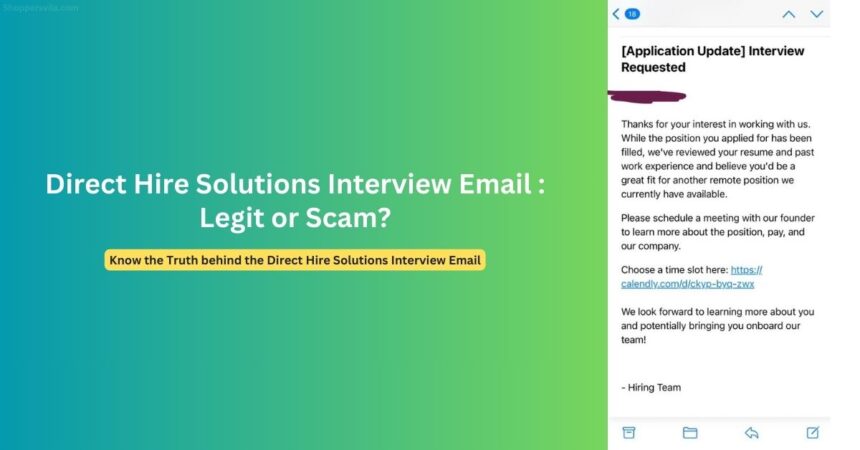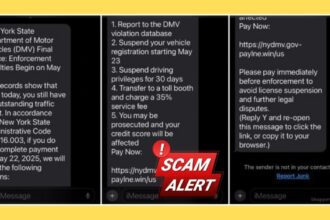A sophisticated recruitment scam is sweeping across job boards and email inboxes nationwide, targeting vulnerable job seekers with fake interview requests from a company called “Direct Hire Solutions.” The scam follows a pattern similar to those impersonating legitimate staffing agencies but employs specific tactics designed to exploit today’s remote hiring landscape.
As employment scams continue to rise in 2025, this particular scheme has caught the attention of cybersecurity experts and consumer protection agencies due to its widespread reach and convincing presentation. Recipients report receiving professional-looking emails claiming they’ve been selected for remote positions with attractive compensation, despite never having applied to the company.
Overview of the Direct Hire Solutions Interview Scam
The scam typically begins with an unsolicited email titled “[Application Update] Interview Requested” from addresses using domains like [email protected] or [email protected]. These messages claim to be following up on a job application the recipient supposedly submitted, creating an initial false sense of familiarity.
“What makes this scam particularly effective is its timing,” explains cybersecurity analyst Mara Winters. “With many companies conducting legitimate remote hiring, and job seekers often applying to dozens of positions weekly, it’s easy to momentarily believe you might have applied to a position and forgotten about it.”
The email follows a carefully crafted template:
- It acknowledges the recipient’s “interest” in working with the company
- It claims the position originally applied for has been filled
- It states the recipient’s “resume and past work experience” have been reviewed
- It offers an alternative remote position with unspecified details
- It invites the recipient to schedule a “meeting with our founder” via a Calendly link
- It ends with vague but positive language about “potentially bringing you onboard”
Lisa Murray, who received such an email last month, describes her experience: “Initially I thought it might be legitimate because the email looked professional. But when I couldn’t remember applying to a company called Direct Hire Solutions and couldn’t find any information about them online, alarm bells started ringing.”
Email and Communication Patterns
The fraudulent communications follow specific patterns that cybersecurity experts have identified:
Email Structure and Formatting
The messages are professionally formatted and relatively free of the grammatical errors that once characterized obvious scams. They often include:
- Company logos or basic branding elements
- Professional salutations and sign-offs
- Clean formatting that mimics legitimate corporate communications
- Reply-to addresses that differ from the sending address
- Use of job board or applicant tracking system domains (like applytojob.com or mail.jazz.co)
Communication Flow
After initial contact, the scam typically progresses through predictable stages:
- Initial outreach: The unsolicited email claiming to be following up on an application
- Scheduling attempt: A link to a calendar scheduling system for an “interview”
- Voice messages: Some recipients report receiving voicemails encouraging them to respond
- Video interview requests: Invitations to Zoom, Teams, or other video platforms
- Personal information collection: During or after the “interview,” requests for sensitive data
Language and Persuasion Tactics
The scammers employ specific language designed to manipulate recipients:
- False familiarity: “Thanks for your interest in working with us” creates the impression of a prior relationship
- Exclusivity: Suggesting the recipient has been specially selected based on their qualifications
- Urgency: Implying opportunities will be filled quickly
- Appeal to authority: Mentioning meetings with “founders” or executives to seem prestigious
- Vagueness about details: Providing minimal specifics about the actual position or company
“These communications are deliberately designed to bypass our usual skepticism,” notes social engineering expert Dr. James Chen. “They leverage our desire for positive employment news and our natural tendency to want to believe good things.”
Red Flags: How to Identify DirectHire Solutions Recruitment Interview Scams
Security experts highlight several warning signs that can help identify fraudulent interview requests:
Company Verification Issues
- Lack of online presence: Legitimate companies have substantial digital footprints
- Missing corporate details: No physical address, tax ID, or registration information
- Domain inconsistencies: Company name doesn’t match email domains
- Recent website creation: Newly created websites with minimal content
- Limited or suspicious reviews: Few reviews or overwhelmingly positive ones that sound artificial
Process Abnormalities
- No recollection of applying: Being contacted for positions you never applied for
- Skipping traditional screening: Immediate interview offers without preliminary screening
- Founder involvement: As one Facebook commenter noted, legitimate large companies rarely arrange initial interviews with founders
- Excessive convenience: Unusually flexible scheduling or immediate availability
- Bypassing HR departments: Direct communication from executives for entry-level positions
Communication Red Flags
- Multiple email domains: Communications coming from different addresses
- Generic email services: Using free email providers rather than corporate domains
- Non-personalized messages: Templates that don’t reference specific details of your application
- Requests to continue on messaging apps: Attempts to move conversations to WhatsApp or Telegram
One victim shared: “When they asked me to purchase equipment from their ‘approved vendor’ before starting, I finally realized it was a scam. By then I had already shared considerable personal information during what I thought was a legitimate interview process.”
The Evolving Sophistication of Job Scams
What makes modern recruitment scams like the Direct Hire Solutions scheme particularly dangerous is their increasing sophistication. Today’s scammers employ advanced tactics:
Technology Exploitation
- ATS impersonation: Using domains that mimic legitimate Applicant Tracking Systems
- Calendar integration: Utilizing legitimate scheduling tools like Calendly
- Video interviews: Conducting actual video calls to build trust
- Data scraping: Leveraging information from public profiles to personalize approaches
Psychological Manipulation
- Remote work appeal: Exploiting the desirability of flexible, work-from-home positions
- Economic anxiety: Targeting people during periods of high unemployment or economic uncertainty
- Professional appearance: Creating communications that look identical to legitimate recruiters
- Multi-stage approach: Building credibility through multiple interactions before requesting sensitive information
“The days of obviously fake Nigerian prince emails are long gone,” explains cybersecurity researcher Taylor Williams. “Today’s scammers study legitimate business practices and mimic them with remarkable accuracy.”
Protecting Yourself from Recruitment Scams
Taking proactive steps can significantly reduce your risk of falling victim to employment scams:
Before Responding to Any Job Communication
- Verify the company’s existence:
- Search for the company on business registration databases
- Look for a substantial, established online presence
- Check their social media profiles for consistent activity and engagement
- Verify physical addresses through Google Maps or similar services
- Track your applications:
- Maintain a log of positions you’ve applied for
- Be immediately suspicious of opportunities you don’t remember pursuing
- Check your sent emails to confirm whether you actually applied
- Research email domains:
- Verify that email addresses match the company’s official website domain
- Be wary of generic domains like gmail.com or outlook.com
- Search for the sending domain to determine if it’s associated with legitimate job boards
During the Interview Process
- Maintain healthy skepticism:
- Question opportunities that seem too good to be true
- Be alert to interviewers who can’t answer basic questions about the company
- Pay attention to whether questions focus on job skills or personal/financial information
- Protect sensitive information:
- Never provide banking details during initial interviews
- Be cautious about providing social security numbers before official employment offers
- Don’t share copies of identification documents until you’ve verified the company’s legitimacy
- Watch for financial red flags:
- Decline requests to purchase equipment, software, or training materials
- Refuse to send money for “application fees” or “training costs”
- Be suspicious of job offers that involve transferring or receiving funds
After Identifying a Potential Scam
- Document everything:
- Save all communications
- Take screenshots of websites before they disappear
- Record names, email addresses, and phone numbers used
- Report the scam:
- Contact the FBI’s Internet Crime Complaint Center (IC3)
- Report to the Federal Trade Commission
- Alert the platforms where you encountered the scam (LinkedIn, Indeed, etc.)
- Warn others:
- Share your experience on social media
- Post reviews on job boards and company review sites
- Alert professional networks in your industry
The Impact of Fraudulent Direct Hire Solutions Email on Victims and the Economy
The consequences of these scams extend far beyond immediate financial losses:
Individual Impact
For victims, the effects can be devastating:
- Financial losses from direct theft or identity fraud
- Lost time and emotional distress
- Damaged professional confidence
- Increased skepticism toward legitimate opportunities
Economic Impact
At a broader level, these scams:
- Reduce trust in digital hiring processes
- Create additional friction in labor markets
- Impose costs on legitimate companies who must invest in verification systems
- Divert law enforcement resources from other priorities
“The psychological impact shouldn’t be underestimated,” says Dr. Elena Rivera, a psychologist specializing in work-related trauma. “Many victims experience shame and self-blame, wondering how they could have fallen for something that seems obvious in retrospect.”
Frequently Asked Questions
1. Is a Direct Hire Solutions Job Interview Email Legitimate?
No, according to multiple reports and investigations, the interview requests from “Direct Hire Solutions” using domains like [email protected] appear to be fraudulent. This entity displays multiple red flags: recipients report never having applied to this company, the company lacks verifiable online presence, and communications come from generic or multiple email domains. Legitimate recruitment doesn’t involve unsolicited interview requests for positions you never applied to.
2. How Can I Verify if a Recruitment Email is Legitimate?
To verify a recruitment email:
- Check if you actually applied to the position mentioned
- Search for the company online through multiple sources (LinkedIn, Better Business Bureau, business registries)
- Call the company using contact information found through independent sources (not from the email)
- Verify the email domain matches the company’s official website
- Check the company’s careers page to see if the position actually exists
3. What Should I Do If I’ve Already Responded to a Scam Interview Request?
If you’ve already engaged with what you now suspect is a scam:
- Cease all further communication immediately
- Do not click any additional links or download attachments
- If you’ve shared financial information, contact your bank or credit card company
- Place a fraud alert on your credit reports
- Change passwords for any accounts you may have mentioned
- Report the incident to authorities (FTC, IC3, local police)
4. Can Scammers Steal My Identity Just From My Resume?
Yes, resumes typically contain valuable personal information that can be used for identity theft or targeted phishing attacks, including:
- Full name and contact information
- Employment history with dates
- Educational background
- Professional certifications and licenses
- Sometimes, additional personal details
While a resume alone may not enable complete identity theft, it provides scammers with enough information to create convincing personalized scams or to piece together more complete profiles when combined with other data breaches.
5. How Widespread Are Job Interview Scams?
Job scams have reached epidemic proportions. According to recent data from the FBI’s Internet Crime Complaint Center, employment scams resulted in reported losses exceeding $500 million in 2024 alone, representing a 35% increase from the previous year. The actual impact is likely much larger, as many victims don’t report their experiences due to embarrassment or lack of awareness about reporting channels.
The Global Response to Recruitment Fraud
Law enforcement agencies and technology companies are fighting back against the rising tide of employment scams:
Law Enforcement Initiatives
- Creation of specialized cybercrime units focusing on employment fraud
- International cooperation to track and prosecute scam networks
- Development of victim support resources and recovery assistance
Platform Protections
- Job sites implementing verification processes for employers
- Email providers enhancing spam and phishing detection
- Video conferencing platforms adding security features to prevent impersonation
Educational Campaigns
- Government agencies publishing scam awareness guides
- Non-profits offering free webinars on safe job searching
- Industry associations creating verification standards
Conclusion: Vigilance in the Digital Job Market
As remote work continues to normalize and online recruitment becomes standard practice, job seekers must maintain heightened awareness of potential scams. The “Direct Hire Solutions” scheme represents just one variation in an ever-evolving landscape of employment fraud.
Protecting yourself requires a balanced approach: maintaining healthy skepticism without becoming paralyzed by fear. Remember that legitimate employers follow predictable, transparent recruitment processes and never request financial information or payments during the hiring process.
By familiarizing yourself with common scam patterns, verifying companies before engaging, and trusting your instincts when something seems suspicious, you can navigate the job market more safely. When in doubt, remember this simple guidance: legitimate opportunities don’t come from companies you’ve never heard of for positions you never applied to.
If you encounter suspicious job communications, report them to the appropriate authorities and share your experience with others. Through collective vigilance and information sharing, job seekers can help reduce the effectiveness of these scams and protect vulnerable individuals during their employment search.
This article is for informational purposes only. If you believe you’ve been targeted by a scam, contact relevant authorities in your jurisdiction.






































